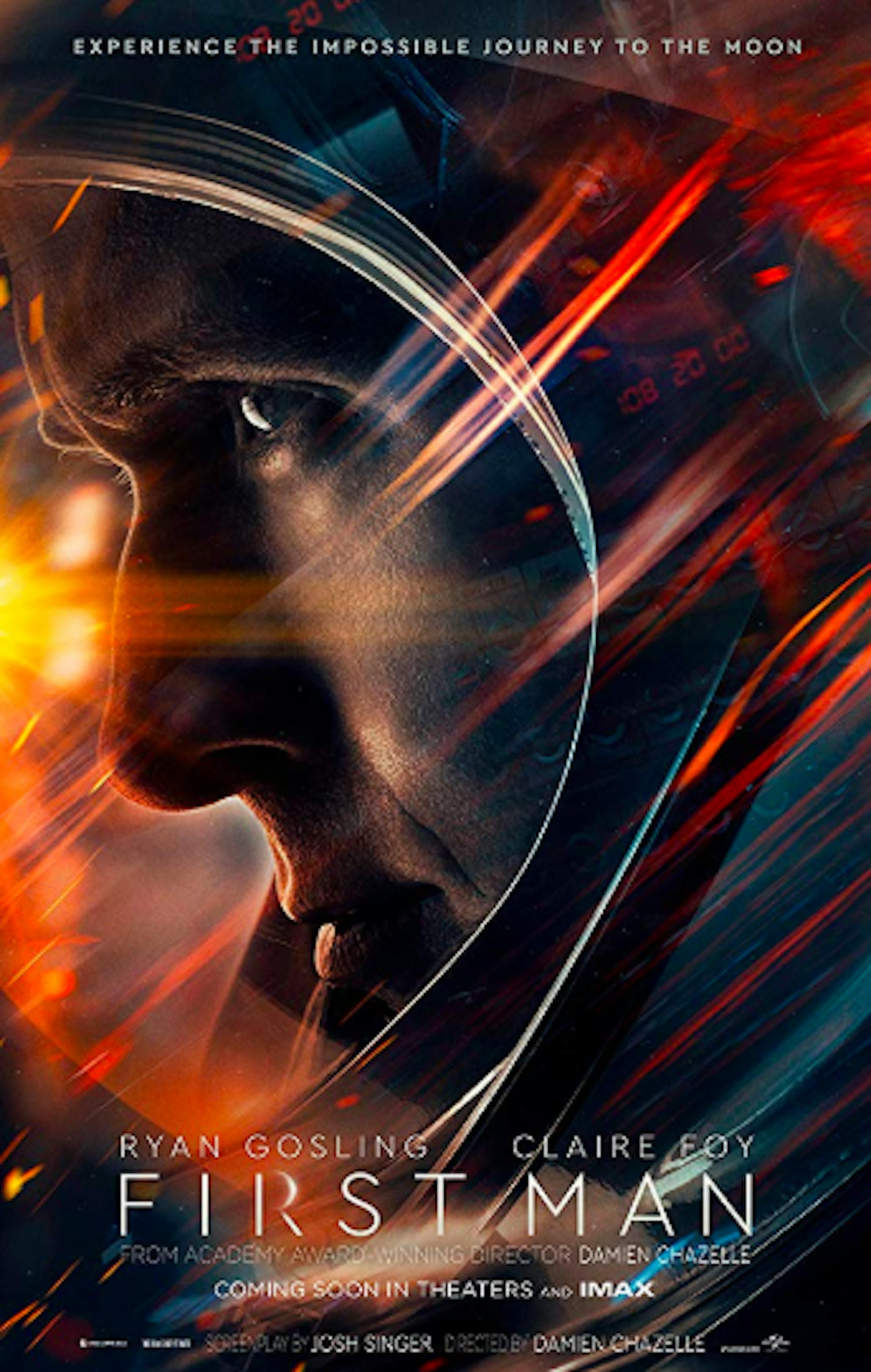Hollywood has produced many ambitious movies about the perils of space travel over the past five years, including “Gravity” (2013), “Interstellar” (2014) and “The Martian” (2015). How, then, can a movie about Neil Armstrong ever hope to stand out at a filmic moment already so fixated on aggrandizing and dramatizing space travel?
The answer: Don’t make it about the space travel. Make it about the man.
“First Man” portrays the life of Neil Armstrong (Ryan Gosling), from joining the NASA astronaut program in 1962 to his successful completion of the Apollo 11 mission in 1969. "Portrays" is the most appropriate word to use, because “First Man” tells the story of Armstrong’s life, handling it with narrative emotionality and refusing to become a strictly biographical or documentary work focusing on his achievements. While a significant part of the film is, obviously, Armstrong’s work with NASA, the film seeks to focus just as much on Armstrong’s personal life, adding dimension to a figure already so mythicized in history.
Arguably, Armstrong is a difficult figure to tackle. According to James Hansen, the author of the biography on which “First Man” is based, Armstrong was actually quite private. Though he was the first person to set foot on the moon, he was hesitant about his status as an American hero, focusing on the mission itself rather than its historical impact. Gosling communicates this reservedness and stoicism quite well; his Armstrong rarely loses his cool, making the few moments where he does surrender to his emotions much more powerful.
When, for instance, Armstrong loses his young daughter to cancer early in the film, it creates a cloud of grief that stays with him for the remainder of the film. Watching Armstrong sit at his desk alone and sob for his daughter, after displaying such a solemn acceptance of her death in front of his family, reveals a pivotal crux of Armstrong’s character — he is quite collected on the outside, but deals with trauma in a very personal, solitary way. This depiction is just one of the ways in which “First Man” distances itself from the dazzling drama of space travel seen in other films and hones in on Armstrong’s character, treating his story with far greater intimacy.
While the character is interesting, and while Gosling is clearly accurate in his portrayal, it is also an incredibly challenging task to keep the viewer engaged because his exterior is so even-tempered. To tell Armstrong's story, the film heavily relies on vignettes that sometimes felt slightly detached. While this approach evokes a more personal representation rather than an over-dramatized retelling, there is not enough narrative to latch onto. “First Man” does slow down in the middle as we see Armstrong move between his personal and professional lives rather arbitrarily; it starts to drift away from those meaningful personal moments and back into Armstrong’s relentless stoicism, leaving the story with a hollow feeling. However, it finds its footing again as the film nears its apex: the actual Apollo 11 mission.
Each of the three or four sequences that actually depict Armstrong in flight are incredibly well-choreographed. Most of the Gemini VIII mission, for example, is shot from inside the cockpit, inviting the viewer to share in the visceral reactions of space flight — we only see the surface of Earth from inside the small window of the craft. The structures of the spacecraft creak and groan ominously in flight, and when things go wrong, jarring camerawork and barely-audible radio communications heighten the stakes of traveling in such a relentless environment.
The moon landing itself is a work of cinematographic mastery. The film effectively builds tension leading up to the historic moment, and the music is absolutely ethereal. The eeriness and beauty of landing on the Moon is portrayed with sweeping shots of the surface and the slow, nuanced movements of Armstrong and Buzz Aldrin. And yet, the whole experience is tinged with a sort of soberness as we follow Armstrong, who does not treat the moment with the historical gravitas that we may crave. We see the moon landing through the eyes of a man who is still grieving for his daughter, who is comfortable with potentially dying on this mission and who does not wish to see himself as a legendary figure, which makes the moment unexpectedly haunting and meaningful.
It is unfortunate that “First Man” struggles with the one thing that is meant to set it apart. While its portrayal of Armstrong is intimate and seeks to shed light on the actual man behind the legend, it is inconsistent with its depictions and does not seem to know how to focus on either the historical grandeur of the missions or the character of Armstrong himself. “First Man” clearly knows how to effectively depict the dangers and drama of space travel, and there are moments where it absolutely nails the emotional toll of such an undertaking on Armstrong. Fortunately, these moments do make up for most of the narrative flatness in between, still moving audiences by the film's end.
'First Man' tackles Neil Armstrong beyond the legend

A promotional poster for 'First Man,' starring Ryan Gosling, is pictured.
Summary
While it sometimes stumbles narratively, 'First Man' is still an intimate portrayal of the actual man behind the historic Apollo 11 Moon landing.
4 Stars





